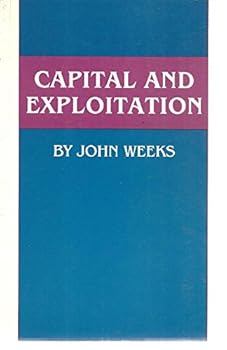Capital and Exploitation
Select Format
Select Condition 
Book Overview
Professor Weeks proposes that the key to Marx's critique of capitalist society is the labor theory of value. A commodity-producing society, he argues, necessarily gives rise to a capitalist society, so that commodity production and the exploitation of labor are inseparably linked. Originally published in 1982. The Princeton Legacy Library uses the latest print-on-demand technology to again make available previously out-of-print books from the distinguished...
Format:Paperback
Language:English
ISBN:0691003661
ISBN13:9780691003665
Release Date:January 1982
Publisher:Princeton University Press
Length:226 Pages
Weight:0.68 lbs.
Dimensions:0.7" x 5.5" x 8.5"
Customer Reviews
2 ratings
Excellent
Published by Thriftbooks.com User , 15 years ago
The above reviewer has done a phenomenal job in illustrating the value of this book - My review is simply a reinforcement of his. The exception is that I give this 5 instead of 4 stars simply because the author's heavy criticisms of Engels's lack of understanding of the dominance of the mode of production on exchange, whether justified or not, does not detract from the explanatory power of this book. I highly recommend this to be read before reading Capital, as it is perhaps the best overview of the work in general and will greatly help in understanding Capital itself. However, note that the level of abstraction and articulation is quite advanced.
Brilliant technical exposition of Marxist economics
Published by Thriftbooks.com User , 17 years ago
John Weeks' "Capital and Exploitation" is an excellent discussion of Marxist economic theory on the core subjects, such as value, competition and money. Weeks not only explains in a technical but crisp manner how certain difficult concepts such as surplus value work in Marxist theory, but he also enabled what one might, with some ironic reference, call an epistemological break with older Marxist economics of the monopoly capital school. This is done in a structured manner, though with dense and sometimes difficult writing, by analysing the core concepts of Marxist economics in turn, beginning with the commodity. Weeks shows in this book, in turn, how value is a social relation arising out of the capitalist mode of production and its reproduction through exchange and competition; how this is to be contrasted with the popular view of Marx' Law of Value as being essentially Ricardian (embodied labor); why surplus value and the rate of surplus value are to be conceptually analyzed for an entire society before being analyzed for any individual capital; what the Marxist theory of money is, how it contrasts with the bourgeois theory of money, and how it is superior by understanding money (among other things) as a commodity; what the role of credit and fictitious capital is in capitalist reproduction, and the struggle between finance capital and industrial capital; how competition is a necessary part of the capitalist mode of production, and how Marxist theory of competition differs from the quantity theory of competition; and how accumulation through competition must lead to crises, and hopefully the overthrow of the capitalist mode of production. The book suffers from one major flaw though, which prevents me from giving its otherwise seminal treatment of Marxist economics the full five stars. This is Weeks' highly erroneous and ill-conceived attack on Engels in the first two chapters, in particular the first. He incorrectly, as has so often been done, posits a significant difference between Engels and Marx at a theoretical level, and he does so by either ignoring or completely misreading the Anti-Dühring, among other things. Apparently Weeks was unaware of Marx' collaboration on this subject as well as the context of many of Engels' statements. Therefore, I would recommend skipping the first two chapters, but I equally recommend any socialist to read the rest of this book, as it has really paved the way for modern Marxist political economics and its scientific revival. The book contains practically no mathematics, but is written at a consistently high level of abstraction combined with a rather fast pace of explanation, so it is probably suitable for somewhat experienced readers of economic texts. For those it should be very rewarding, and Weeks' explanation is on some of the major concepts still unsurpassed.





